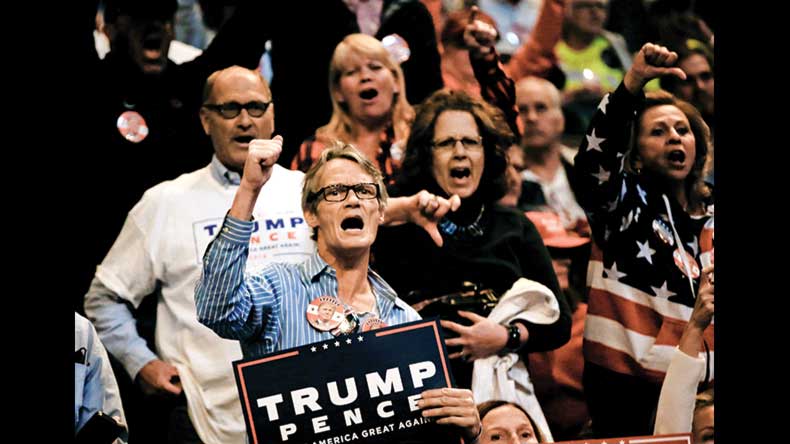MONTREAL: In the United States this past week, the big debate wasn’t Trump versus Clinton, it was Drudge versus Huffington. And Fox versus the New York Times. And Breitbart versus CNN. All over the media landscape, “right wing” and “left wing” outlets screamed at each other from their fortresses, each accusing the other of everything up to, and sometimes including, treason.
At a Trump rally on Monday, thousands chanted “CNN Sucks”. On Friday, CNN ran a piece called “Donald Trump and the Breitbart election”. The CNN piece attempted to eviscerate Breitbart.com, a pro-Trump news site run, until recently, by Trump’s current campaign CEO, Stephen Bannon. Why would massive CNN go after little Breitbart? While avowedly pro-Clinton news outlets like the New York Times and CNN still have a much wider reach than the “right sites”, including Fox News, the right sites are growing fast. Over the past election cycle, Breitbart has soared in popularity, reaching over 200 million unique views in September alone. One reason is that some of the many stories that were floating around the “fringe right” media, were first attacked as conspiracy theories by the “mainstream” media before being proven true.
For example, for months, Breitbart and others were saying Clinton was ill. With flat denials but no “proof” from the Clinton camp, right site imaginations ran riot. Wanting to shut the questions down, some major pro-Clinton outlets said, overtly, that questioning Clinton’s health is as sexist as questioning Obama’s place of birth was racist. For example, on 24 August, CNN ran a story: “The new birthers: Debunking the Hillary Clinton health conspiracy”. Then, on 11 September, Clinton collapsed on camera. The campaign issued a diagnosis of “pneumonia” and friendly media said that should close the issue because, as Brian Stelter said on CNN: “If she had pneumonia and she went to the 9/11 ceremony this morning, that’s a very strong, bold thing to do…We should be honest about the double standards that women sometimes face with regards to their health.” So, again, question Clinton and you are misogynist.
Similarly, for months the right sites had expounded all sorts of stories about dubious, at best, foreign funding going into the Clinton Foundation. Then the AP ran the investigative piece: “Many donors to Clinton Foundation met with her at State”, and it could no longer be ignored. So it was derided. CNN political commentator and former Counsellor to President Bill Clinton, Paul Begala, said on CNN: “This is politics at its worst. This is a completely new standard, this is what the press and the Republicans do every time the Clintons run. It’s a different standard for the Clintons.” The same mainstream media trust challenge is there for other groups as well, including Bernie Sanders supporters. During the Democratic Primaries, there were online rumours of collusion between the Democratic Party (DNC) and the Clinton campaign designed to knock Bernie out of the race. That was dismissed as “paranoia” by CNN and others. Then WikiLeaks dumped a bunch of DNC emails and, turns out, there had indeed been questionable activities.
The result is that, while the vast majority of conspiracy stories floating around out there are completely bonkers, some, including those so loudly “debunked” by the mainstream, are turning out to have elements in them that are not only true, but potentially important. And still they are being largely ignored.
This is the old political lesson of Watergate writ large: the cover-ups are having greater repercussions than the actual events. One result of the overt bias is that, according to Gallup polls, only 14% of Republicans trust the media. Bernie supporters aren’t polling much higher.
Online stats also show people are searching for the truth. Literally. While CNN panels discuss the details of Trump’s sexual past, online searches for the Podesta emails on WikiLeaks far outstrip searches on Trump and women. The fringe is getting decided less fringy, and can no longer be derided into political oblivion. And so the discrediting war wages on. The influential right wing news aggregator DrudgeReport.com rarely runs a positive piece on Clinton. The influential left wing site HuffingtonPost.com rarely runs a positive piece on Trump. Post-debate, The Daily Show did a segment about Trump lying during the debate, but didn’t question any of Clinton’s statements. And so it goes on. These “two solitudes” present completely different realities. This is far beyond partisan business as usual. Tom Rosenstiel, the executive director of the American Press Institute, described one of the camps this way: “This is the journalism of affirmation, not verification…It’s designed to reaffirm what you’re thinking.”
I’m not going to say which camp Rosenstiel was referring to. At this point, I’m not sure it matters. Though which side you think he was talking about may tell you something about your own biases.
This last week, President Barack Obama addressed the crisis of trust in the media at a speech in Pittsburg. “We are going to have to rebuild within this wild-wild-west-of-information flow some sort of curating function that people agree to…There has to be, I think, some sort of way in which we can sort through information that passes some basic truthiness tests and those that we have to discard, because they just don’t have any basis in anything that’s actually happening in the world…The answer is obviously not censorship, but it’s creating places where people can say ‘this is reliable’ and I’m still able to argue safely about facts and what we should do about it.”
That place was supposed to be “mainstream” sources like CNN. If Obama thinks they are failing, we are in serious trouble. And as for finding “some sort of curating function that people agree to”, I’d be really interested to see how that works. Really.
Cleo Paskal is The Sunday Guardian’s North America Special Correspondent.

